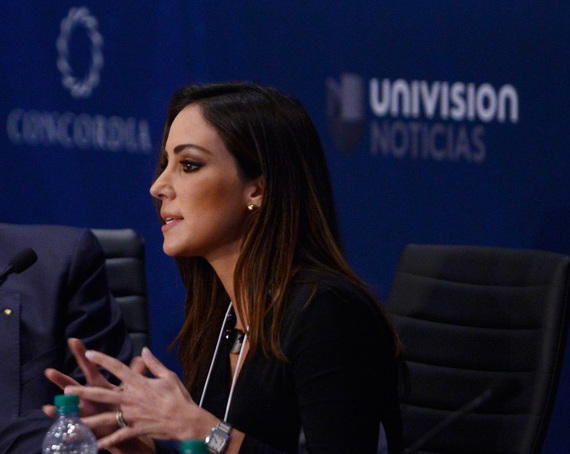"The only sustainable peace in Colombia and true democracy in Cuba requires peace in Venezuela."
These are the insightful words of former President of Bolivia, Jorge Quiroga, speaking at Concordia's inaugural Summit on the Americas. His statement, made during a discussion I moderated on the thawing relationship between the U.S. and Cuba, demonstrates the interconnected nature of the political and economic issues in the region.
It also underscores the dire need for the international community to coalesce in condemnation of the crisis in Venezuela to ensure prosperity and democracy throughout the region.
As a broadcast journalist in the United States, I struggle to get stories from the crisis in my country, Venezuela, on the air. People are usually only interested if tear gas and dead bodies are involved. I did manage to file a story on the 2014 protests for ABC's World News Tonight. This same story was erroneously passed off as a current news story on last Sunday's episode of "Last Week Tonight" with John Oliver. Not only that, he's previously joked that Venezuela is a country that you think about so little, you don't even know where to locate it on a map.
This goes to show that there is insufficient public information on the current situation in Venezuela. It also reveals a general lack of awareness of how intertwined the situation in Venezuela is with what's going on in Colombia and Cuba. Yet, the interrelationship between these countries has far reaching implications for Latin America, the United States, and the broader international community.
The United States strives to ensure the success of the Colombian peace process and achieve true democracy in Cuba, two major events playing out in the region.
Current events in Cuba and Colombia directly relate to the crisis in Venezuela.
The Venezuelan government has established ties to Colombia's FARC rebels. As peace negotiations between the FARC and the Colombian government are taking place in Havana, Venezuela is serving as an intermediary between both parties. The affinity between the FARC and Venezuela's government isn't only ideological: Venezuela has also become a safe haven for drugs transported out through the Caribbean.
In the case of Cuba, Venezuela continues to enjoy close ties with the current government, despite the normalization of diplomatic ties between the United States and Cuba. Cuba is still involved in many key aspects of Venezuelan life, ranging from security to Venezuelan identification cards.
On the other hand, Venezuela is a source of oil and refined products for the starving Cuban economy. The Venezuelan government takes this aid very seriously. Even during the major economic crisis, it maintains around 80,000 barrels per day in oil shipments to Cuba.
For all these reasons it is shocking, and, frankly, misguided for the United States to completely ignore the crisis in Venezuela while normalizing relations with Cuba.
The renewed diplomatic ties also open up the door for the United States to become a key player in the Colombian peace negotiations. However, if the U.S. chooses to ignore Venezuela, it loses an opportunity to reaffirm its future influence in the region.
Neither the U.S. nor the rest of the international community can simply turn a blind eye to the crisis in Venezuela because it can explode beyond its borders. No one understands this better than Luis Almagro, Secretary General of the Organization of American States.
He recently published an unprecedented statement condemning Venezuelan President Maduro's harsh accusations, a public debate sparked by Almagro's comments at Concordia's Summit on the Americas. Almagro wouldn't have taken this action without being able to count on the unwavering support of a large group of Latin American countries.
Other countries in the region cannot simply standby as the crisis in Venezuela unfolds.
The line between playing dumb and being complicit is a very fine one to tread. Increasingly, the international community risks being guilty of the latter, as the Venezuelan government continues to violate human rights and undermine democracy.
Continued condemnation and unified action from world leaders would further pressure Maduro to respect democracy in Venezuela.
The Cuba-Venezuela-Colombia triangle reveals the necessity for collaboration, not only amongst governments, but also across the public and private sectors. A key takeaway from the discussion on Cuba at Concordia's Summit on the Americas was that the private sector also has a crucial role to play in improving democracy in Cuba when pursuing business opportunities on the island.
Businesses have a responsibility to build not only hotels, but also institutions. The scale of the public sector can support business endeavors and build off the efficiencies of the private sector.
This notion is not unique to Cuba - it can be applied throughout the region. Business, governments, and civil society organizations all have an obligation to address the heightening tensions in Venezuela to seize the occasion of peace, economic stability, and democracy throughout the region.
Mariana Atencio is a host and correspondent at Fusion.
Concordia is a nonprofit, nonpartisan organization that enables effective public-private partnerships to create a more prosperous and sustainable future. Concordia's community is comprised of the world's preeminent thought-leaders. Commentary from Concordia is series of opinion pieces by Concordia's community on pressing global issues from a cross-sector perspective. The views of the writers are their own and not those of the organization.

